
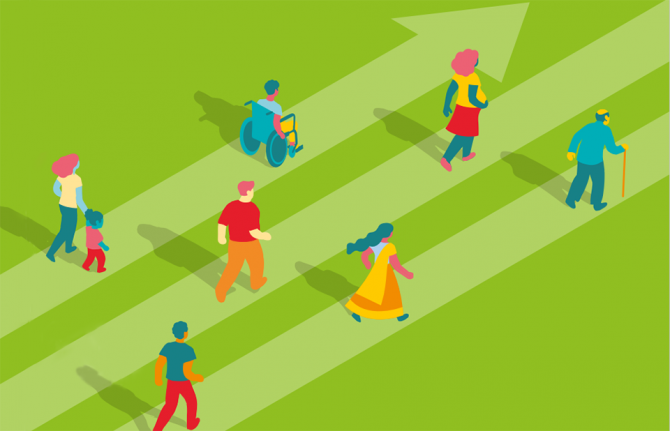
Press Statement
Pandemic Accord: UNAIDS offers lessons from the AIDS pandemic on Bureau’s text
24 July 2023 24 July 2023UNAIDS offers lessons from the AIDS pandemic on the Intergovernmental Negotiating Body Pandemic Accord Bureau text
GENEVA, 24 July 2023—The Joint United Nations Programme on HIV/AIDS (UNAIDS) offers lessons learnt from the HIV/AIDS pandemic to strengthen and sharpen the bureau text of the Pandemic Accord to ensure a truly robust response to current pandemics, and to prevent, prepare for and respond to pandemics of the future.
UNAIDS and the global response to AIDS have unique experience and insight over the past forty years in responding to pandemics. The global AIDS response has shown how effective a pandemic response can be which it outlined recently in its Global AIDS Update 2023 – The Path that Ends AIDS.
While COVID-19 increased HIV vulnerability and disrupted HIV service access for millions of people around the world, the AIDS response, systems, infrastructure and governance model also helped countries respond to both HIV and COVID-19. UNAIDS has a critical interest in protecting the gains in the HIV response, preventing future pandemics and health emergencies which impact people living with and affected by HIV and which could set back efforts to end AIDS by 2030.
Drawing on the more than a quarter-century as a global leader of the fight to end AIDS as a public health threat, UNAIDS offers the following lessons learned for strengthening the current bureau text of the Pandemic Accord:
General language
The current draft could be amended to incorporate much clearer, stronger language on the obligations of high-income countries (HICs) to ensure worldwide access to pandemic products and to proactively provide financial and technical support to enable pandemic responses in low- and middle-income countries (LMICs). The frequent use of “as appropriate” language could be replaced by clear language that conveys the obligation of states to act. In the current draft, much of the burden for prevention and surveillance falls on LMICs, without communicating clear obligations of HICs to assist and support LMICs. It could also have text that commits all countries to prioritise health and medical research.
Human rights and equity
While the draft identifies human rights and equity as core principles of pandemic preparedness, the draft could clarify language regarding the member states’ commitment to protect human rights and ensure equity in all aspects of pandemic prevention, preparedness and response (PPR). The accord could: reconsider the definition of “persons in vulnerable situations” (Art. 1); explicitly reference States obligations to protect and fulfil human rights within its “general principles” (Art. 3.1); mainstream concern for equity throughout provisions of the accord; emphasize formal and substantive equality, alongside non-discrimination, as general principles (Art. 3.1)
Equitable access
With respect to equitable access to pandemic-related products, the bureau draft uses language that suggests that recommended actions are advisory rather than obligatory. UNAIDS recommends that the draft :
- Clearly commit countries that possess pandemic-related medical technologies and knowhow to share it with LMICs in a timely and meaningful manner, including requirements in funding and purchasing agreements for institutions and companies in HICs to share intellectual property rights, technologies and knowhow with researchers and capable manufacturers in LMICs.
- Commit to provide robust financial and technical support for collaborative research between institutions in the North and South to build R&D capacity in LMICs – not only for pandemics and not only for manufacturing, but to enable LMICs to contribute to progress in science and technology for all of humanity.
- Countries to make full use of TRIPS flexibilities to address public health needs during a health emergency.
- Commit all states to waive intellectual property provisions for all pandemic-related products during pandemic and recovery periods.
- Commit Member States to provide political leadership and robust financial and technical support to build strong, flexible medical manufacturing capacity in LMICs before the next pandemic emerges. With future pandemics, surge support will be essential to adapt this capacity in LMICs to manufacture pandemic-relevant products.
- If and when demand for pandemic-relevant products outstrips supply during future pandemics, all Member States must commit to abide by WHO product allocation prioritization recommendations to ensure equitable access, with particular attention to the most vulnerable populations.
Access and benefit sharing
Although the draft specifies obligations among LMICs for actions pertaining to surveillance and the timely sharing of pathogens and data, the draft should be revised to commit Member States to ensure equitable access, including sharing the benefits and profits from the sale of these pathogens. Draw lessons from the Ebola where pathogens from Africa were shared but the medicines were stockpiled in the north leaving people in Africa waiting for charitable donations. The Accord should build on the precedence of the Pandemic Influenza Preparedness agreement (PIP) which facilitates sharing of pathogens and benefits both in terms of vaccines and profit.
Common but differentiated responsibility
While PPR is a shared responsibility of Member States, the draft could make clear that the nature and extent of responsibilities are differentiated based on each country’s financial and technological resources and capacities. As the effects of epidemics are felt most heavily in poor and vulnerable populations, countries that are home to these populations require additional assistance.
Inclusion of community and civil society
Community-led responses play critical roles in reaching marginalized communities with essential health messages and services during a pandemic – as both HIV and COVID-19 have shown – but communities remain under-resourced and inadequately integrated as key partners in national PPR efforts. The Pandemic Accord must acknowledge the central role of community-led responses and commit member states to include communities and civil society in decision-making, planning, preparation, implementation and monitoring.
Sustainable investments in health systems and infrastructure
Sustainable, resilient, well-resourced, equitable, human rights-based and people-centred health systems are essential to PPR and to efforts to achieve Universal Health Coverage. The HIV response has shown clearly how it is possible to leverage HIV investments to build stronger, inclusive, sustainable health and social service systems that respond to both HIV and other health threats. Drawing on previously recommended language on differentiated responsibilities based on national financial and technical capacity, the draft could clearly commit countries to invest major new public financing in health systems – ensuring a well-trained, well-remunerated health workforce (including community health workers); strengthening primary health care; ensuring access to health technologies (including those that are locally produced); and strengthening and effectively using health information systems.
Multisectoral governance
HIV has pioneered inclusive, accountable, participatory health governance across multiple sectors and with community, but there is a risk that PPR governance will be devised as a technocratic, top-down enterprise that does not include the central contributions of communities and civil society. The draft could insist that PPR governance mechanisms be fully inclusive of key stakeholders and integrated at national and regional levels to deal with current pandemics and future health crises. Language on whole-of-government and whole-of-society approaches should be strengthened.
Conclusion
Pandemics continue to exact enormous costs on societies across the world – an estimated 630,000 people died of AIDS-related causes in 2022, and long COVID will has lasting effects on human health and well-being and health infrastructure. In responses to HIV and COVID-19, too many countries and communities have been left to fend for themselves. Responding effectively to current and future pandemics requires the global community to summon the principles of solidarity, equity and people-centred action at the heart of the 2030 Agenda for Sustainable Development. Through learning by doing over decades, the HIV response has shown how it is possible to respond effectively to a pandemic. UNAIDS strongly encourages countries to take on board UNAIDS lessons learned when negotiating revisions to the bureau draft of the Pandemic Accord.
UNAIDS
The Joint United Nations Programme on HIV/AIDS (UNAIDS) leads and inspires the world to achieve its shared vision of zero new HIV infections, zero discrimination and zero AIDS-related deaths. UNAIDS unites the efforts of 11 UN organizations—UNHCR, UNICEF, WFP, UNDP, UNFPA, UNODC, UN Women, ILO, UNESCO, WHO and the World Bank—and works closely with global and national partners towards ending the AIDS epidemic by 2030 as part of the Sustainable Development Goals. Learn more at unaids.org and connect with us on Facebook, Twitter, Instagram and YouTube.


Press Statement
Joint Statement by the Leaders of the Global Fund, UNAIDS and PEPFAR on Uganda’s Anti-Homosexuality Act 2023
29 May 2023 29 May 2023GENEVA | WASHINGTON, D.C., 29 May 2023— The Global Fund to Fight AIDS, Tuberculosis and Malaria (the Global Fund), the Joint United Nations Programme on HIV/AIDS (UNAIDS), and the U.S. President’s Emergency Plan for AIDS Relief (PEPFAR) are deeply concerned about the harmful impact of the Ugandan Anti-Homosexuality Act 2023 on the health of its citizens and its impact on the AIDS response that has been so successful up to now.
Uganda’s Leadership Towards Ending the AIDS Pandemic as a Public Health Threat
Uganda and President Yoweri Museveni have been leaders in the fight to end AIDS. Progress has been made thanks to the implementation of large-scale prevention, diagnosis, treatment and care programs, all provided on the principle of access to health care for all who need it, without stigma or discrimination. This approach has saved lives. The strong health systems built to support the AIDS response serve the entire population of Uganda. This was evident as community health workers and health systems developed for the AIDS response played a key role in tackling COVID-19 and other disease threats. Maintaining this is vital: Failures in the HIV public health response will have system-wide impacts that could negatively affect everyone.
Success Is Possible
We know that we will be able to overcome this public health threat when we ensure that 95% of people living with HIV know their status, 95% of them are on treatment, and 95% of those on treatment have achieved viral suppression. Uganda can reach that. By 2021, 89% of people living with HIV in Uganda knew their status, more than 92% of people who knew their HIV status were receiving antiretroviral therapy, and 95% of those on treatment were virally suppressed. Uganda is well on track to achieve the UNAIDS HIV treatment targets if progress can be maintained.
Discrimination Threatens Progress in the AIDS Response
Uganda’s progress on its HIV response is now in grave jeopardy. The Anti-Homosexuality Act 2023 will obstruct health education and the outreach that can help end AIDS as a public health threat. The stigma and discrimination associated with the passage of the Act has already led to reduced access to prevention as well as treatment services. Trust, confidentiality, and stigma-free engagement are essential for anyone seeking health care. LGBTQI+ people in Uganda increasingly fear for their safety and security, and increasing numbers of people are being discouraged from seeking vital health services for fear of attack, punishment and further marginalization.
Uganda has repeatedly demonstrated leadership and commitment to ending AIDS – and has achieved great success – by leaving no one behind. Together as one, we call for the Act to be reconsidered so that Uganda may continue on its path to ensure equitable access to health services and end AIDS as a public health threat by 2030.
Peter Sands, Executive Director, The Global Fund
Winnie Byanyima, Executive Director, UNAIDS, and Under-Secretary General of the United Nations
Ambassador John Nkengasong, U.S. Global AIDS Coordinator and Special Representative for Global Health Diplomacy, U.S. Department of State
UNAIDS
The Joint United Nations Programme on HIV/AIDS (UNAIDS) leads and inspires the world to achieve its shared vision of zero new HIV infections, zero discrimination and zero AIDS-related deaths. UNAIDS unites the efforts of 11 UN organizations—UNHCR, UNICEF, WFP, UNDP, UNFPA, UNODC, UN Women, ILO, UNESCO, WHO and the World Bank—and works closely with global and national partners towards ending the AIDS epidemic by 2030 as part of the Sustainable Development Goals. Learn more at unaids.org and connect with us on Facebook, Twitter, Instagram and YouTube.
Our work
Region/country


Press Statement
Uganda’s new Anti-Homosexuality Bill would harm public health
03 May 2023 03 May 2023GENEVA/JOHANNESBURG, 3 May 2023—Responding to the passing of the Anti-Homosexuality Bill by the Ugandan Parliament, UNAIDS has warned that its passing into law would undermine Uganda’s efforts to end AIDS by 2030, by violating fundamental human rights including the right to health and the very right to life.
UNAIDS East and Southern Africa Director Anne Githuku-Shongwe said:
“Uganda has made excellent progress in tackling the AIDS pandemic. This new Bill, if passed into law, would undercut that progress.
It would drive communities away from life-saving services, and obstruct health workers, including civil society groups, from providing HIV prevention, testing and treatment.
The evidence is crystal clear: the institutionalization of discrimination and stigma will further push vulnerable communities away from life-saving health services. Research in sub-Saharan Africa shows that in countries which criminalize homosexuality HIV prevalence is five times higher among men who have sex with men than it is in countries without such laws.
By undermining public health, this law would be bad for everyone.
The harmful Bill stands in marked contrast to a positive wave of decriminalization taking place in Africa and across the world, in which harmful punitive colonial legislation is being removed in country after country. Decriminalization saves lives and benefits everyone.
Public health organizations welcomed the President’s rejection of the earlier Bill. As this new Bill, like the earlier Bill, would hurt public health, it too should not be enacted.”
Region/country


Press Statement
UNAIDS urges the Government of Uganda to not enact harmful law that threatens public health
22 March 2023 22 March 2023GENEVA/JOHANNESBURG, 22 March 2023 — Responding to the passing of the Anti-Homosexuality Bill by the Ugandan Parliament, UNAIDS has warned that, if the Bill is enacted into law, it will have extremely damaging consequences for public health, by curtailing the human rights of people living with HIV and some of the most vulnerable people of Uganda to access life-saving services.
UNAIDS East and Southern Africa Director Anne Githuku-Shongwe said:
“If enacted, this law will undermine Uganda’s efforts to end AIDS by 2030, by violating fundamental human rights including the right to health and the very right to life.
It will drive communities away from life-saving services, and obstruct health workers, including civil society groups, from providing HIV prevention, testing and treatment.
The evidence is crystal clear: the institutionalization of discrimination and stigma will further push vulnerable communities away from life-saving health services. Research in sub-Saharan Africa shows that in countries which criminalize homosexuality HIV prevalence is five times higher among men who have sex with men than it is in countries without such laws.
By undermining public health, this law will be bad for everyone.
This law, if enacted, will hurt Ugandans. It will cost lives and it will drive up new HIV infections. We urge Government to not enact this harmful law.”
The law would impose a penalty of life imprisonment for homosexual acts and the death penalty for so-called “aggravated offences”. It even includes a duty to report acts of homosexuality, with failure to do so punishable by up to 6 months in prison.
The harmful Bill stands in marked contrast to a positive wave of decriminalization taking place in Africa and across the world, in which harmful punitive colonial legislation is being removed in country after country. Decriminalisation saves lives and benefits everyone.
Although the Anti-Homosexuality Bill has been passed by parliament, it is not yet enacted as a law and can, in the interest of promoting public health and equal rights of Ugandan citizens, be rejected by the President. It is not too late for this Bill to be rejected and lives to be saved.
Region/country

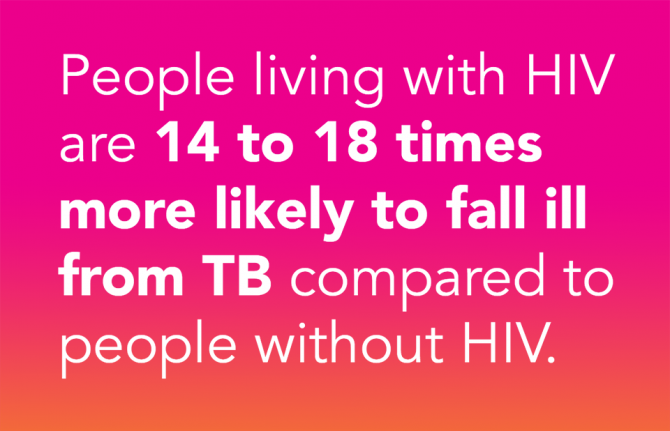

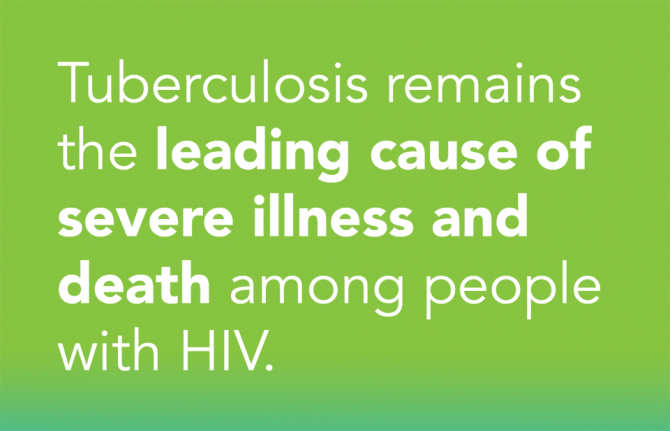
Press Statement
UNAIDS Executive Director Message on World TB Day – Yes, we shall and we can end TB among people living with HIV!
24 March 2023 24 March 2023Today, on World TB Day, we must recognize the urgent need to end the TB epidemic around the world, especially among people living with HIV.
TB remains a leading cause of severe illness and death among people with HIV. According to the World Health Organization Global TB Report 2022, people with HIV are 14-18 times more likely to fall ill from TB compared to people without HIV. About one in three AIDS related deaths were in 2021 were due to TB. We cannot allow this to continue. We must ensure that all people living with HIV and those vulnerable to TB have access to TB prevention, diagnosis, and treatment services.
We continue to miss opportunities to deploy the tools we have against HIV / TB co-infection. Almost half of people living with HIV who developed TB in 2021 were not diagnosed or reported to have TB and coverage of TB preventive therapy among eligible HIV positive persons remains at only 42%.
Like in the responses to HIV and COVID 19, inequalities are the root cause making some people at higher risk of TB, due to social economic, geographic, gender factors and humanitarian and crisis situations. Legal and policy environments also affect access to health services for those who need them the most. We shall not forget that for any health programs to work, we need to put people at the center and engage beneficiaries, particularly the less served communities, to be part and parcel of the planning, implementation and monitoring the response.
Today on World TB Day, I would like to call on all our partners to redouble efforts to ensure early identification, treatment, and prevention of TB in people living with HIV by scaling up the recommended screening and diagnostic tools, providing integrated quality treatment and care, rolling out short-course TB preventive treatments, and removing barriers that affect the smooth implementation of programs.
By ending TB among people living with HIV, we will save more lives, reduce suffering, and move closer to ending both epidemics for good.
UNAIDS
The Joint United Nations Programme on HIV/AIDS (UNAIDS) leads and inspires the world to achieve its shared vision of zero new HIV infections, zero discrimination and zero AIDS-related deaths. UNAIDS unites the efforts of 11 UN organizations—UNHCR, UNICEF, WFP, UNDP, UNFPA, UNODC, UN Women, ILO, UNESCO, WHO and the World Bank—and works closely with global and national partners towards ending the AIDS epidemic by 2030 as part of the Sustainable Development Goals. Learn more at unaids.org and connect with us on Facebook, Twitter, Instagram and YouTube.
Our work

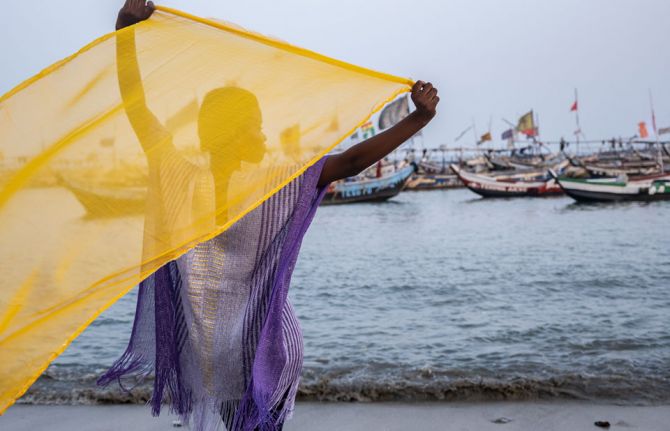
Press Statement
On Zero Discrimination Day, countries urged to decriminalise to save lives
28 February 2023 28 February 2023On Zero Discrimination Day 2023, commemorated on March 1, UNAIDS highlights the need to remove laws that criminalize people living with HIV and key populations.* The 2023 theme, “Save lives: Decriminalize”, points to the positive impact on health and life outcomes when discriminatory and punitive laws are removed.
In 2021, the world set ambitious law reform targets to remove criminal laws that are undermining the HIV response and leaving key populations behind. Recognizing decriminalization as a critical element in the response, countries made a commitment that by 2025 less than 10% of countries would have punitive legal and policy environments that affect the HIV response.
Winnie Byanyima, Executive Director of UNAIDS, said:
"Criminalizing laws chase people away from life-saving treatment. Those need to be removed. The only reason people are still dying of AIDS is the inequalities in society, from social norms, from the lack of opportunities in school, etc. and all these come together to make them more at risk."
"At the country level, repealing criminal laws that are driving people away from HIV prevention and treatment is critical.”
These targets are ambitious but they are necessary
Research in sub-Saharan Africa has shown that the prevalence of HIV among gay men and other men who have sex with men was five times higher in countries that criminalize same-sex sexual activity compared to those that do not, and 12 times higher where there were recent prosecutions.
Criminalization of sex work increases both the risk of sex workers acquiring HIV and their vulnerability to violence perpetrated by clients, police and other third parties. The criminalization of the clients of sex workers has also been repeatedly shown to negatively affect sex workers’ safety and health, including reducing condom access and use, and increasing the rates of violence.
Decriminalization of drug use and possession for personal use is associated with significant decreases in HIV incidence among people who inject drugs, including through greater access to harm reduction services, reductions in violence and arrest or harassment by law enforcement agencies.
Winnie Byanyima said:
"We have the evidence that when you repeal criminal laws on same-sex relations that the risk of contracting HIV falls, the risk of new infections amongst gay men, MSM, drops significantly.
"To me HIV is a disease but it's more a social injustice. It's driven by inequalities in society. These are not things that can happen without a consensus in the society, so we need everybody on board."
Law reform is therefore critical if we are to end AIDS as a public health threat by 2030.
The targets are ambitious but not impossible
Indeed, recent experience is proving just how possible they are. In 2022 alone Belgium and Australia have removed laws criminalizing sex work; Zimbabwe decriminalized HIV exposure, non-disclosure, and transmission and the Central Africa Republic reduced the scope of its HIV criminal laws; Antigua & Barbuda, St Kitts & Nevis, Singapore and Barbados have repealed old colonial laws criminalizing same-sex sexual activity. Kuwait repealed a law criminalizing the imitation of the opposite sex, a law used to target transgender persons while New Zealand removed travel restrictions relating to HIV.
However, despite such encouraging reforms, the world is not on track to ensure that less than 10% of countries have punitive legal and policy environments that create barriers to accessing HIV services. In 2021, 134 reporting countries explicitly criminalized or otherwise prosecuted HIV exposure, non-disclosure or transmission; 20 reporting countries criminalized and/or prosecuted transgender persons; 153 reporting countries criminalized at least one aspect of sex work; and 67 countries now criminalize consensual same-sex sexual activity, according to UNAIDS. In addition, 48 countries still place restrictions on entry into their territory for people living with HIV, while 53 countries report that they require mandatory HIV testing, for example for marriage certificates or for performing certain professions. 106 countries report requiring parental consent for adolescents to access HIV testing.
Such laws and sanctions violate international human rights norms and stigmatize and discriminate against already marginalized populations.
Decriminalisation saves lives and helps advance the end of the AIDS pandemic.
* Key populations are communities at higher risk of HIV infection including gay men and other men who have sex with men, people who use drugs, sex workers, transgender people and people in prisons and other closed settings.

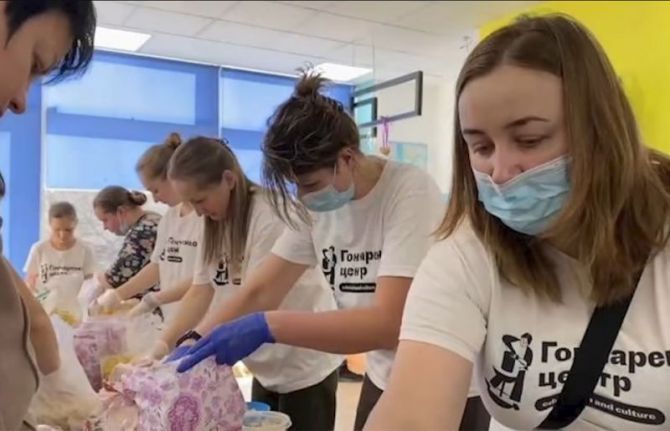
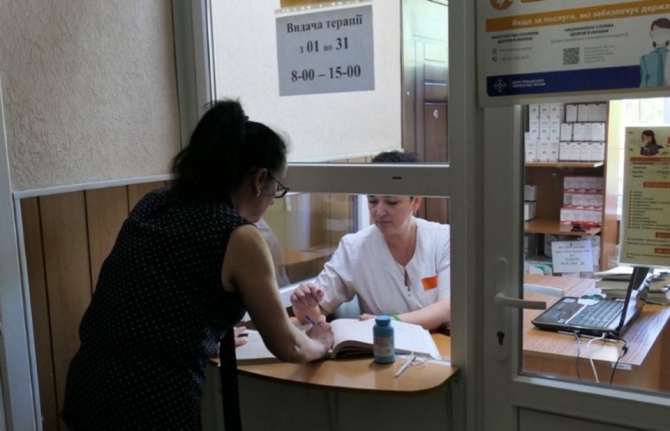
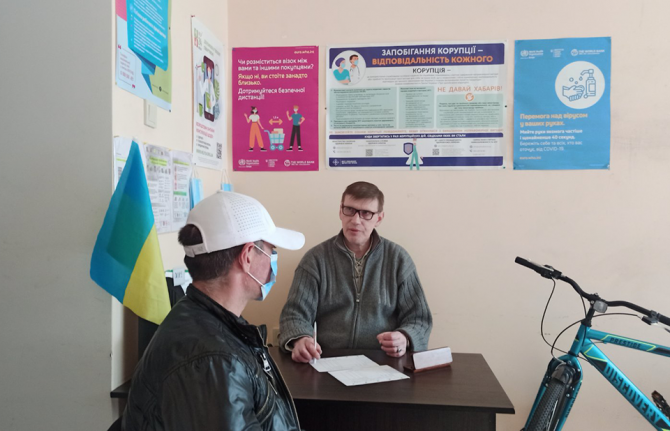
Press Statement
One year on: We must sustain the HIV response in Ukraine
23 February 2023 23 February 2023One year on, the war in Ukraine continues to inflict massive suffering and destruction. Since the start of the war on 24 February 2022, more than 13.5 million people have been internally displaced or forced to flee to neighboring countries as refugees, including people living with HIV and key populations.
Ukraine, the country with the second-largest AIDS epidemic in the Eastern Europe and Central Asia region, has been hit hard by the war.
The country was making strong progress in the AIDS response by: 1) increasing the number of people living with HIV on life-saving medicine (more than 150 000 people are on treatment out of 240 000 living with HIV); 2) working hand in hand with community-based organisations and 3) reaching full state financing of innovative HIV prevention services among key populations.
The shock of the war pushed all stakeholders to protect those precious gains.
The government of Ukraine and civil society partners have received enough anti-retroviral therapy (ARV), tuberculosis medicine, and opioid substitution therapy (OST) to provide uninterrupted treatment for everyone with the support of the Global Fund to Fight AIDS, Tuberculosis and Malaria, the United States President’s Emergency Plan for AIDS Relief (PEPFAR), UNAIDS, and other partners.
Civil society has been the engine of the national HIV response along with the Ukrainian Public Health Centre before the war and throughout the year. They have delivered services, medicines, and humanitarian aid to those in need without fail despite bombings, attacks, lack of electricity and reduced access to the east and south of the country.
This effort needs our ongoing support and funding. We cannot let Ukraine’s HIV response fall back.
UN agencies and partners on the ground have been working closely with local authorities to reach and help people in need. More recently they have delivered humanitarian assistance to hard hit territories in the country that have only now become accessible.
“Delivering essential aid and assistance relies on collaboration,” said Winnie Byanyima, UNAIDS Executive Director. “A coalition of government, civil society and international organisations has been and continues to be a cornerstone of the effective HIV response in Ukraine during the war. UNAIDS stands in solidarity with all the people and our partners working so hard on the frontlines.”
A UNAIDS Emergency Fund has enabled partners across the country to sustain HIV care and support services, as well as providing direct humanitarian assistance and targeted support to the most vulnerable. This has meant, for example, creating dozens of shelters for internally displaced persons, including people who use drugs, LGBTIQ+ people, and other key populations linking HIV service providers with available humanitarian assistance programmes. The Fund has received support from the Red Cross Monaco, the United States of America and Germany.
With further funding from Germany, civil society organizations in Moldova, Poland, and other neighboring countries united their efforts to improve access to services for Ukrainian refugees living with HIV.
UNAIDS has issued an urgent call to the international community for additional funding for civil society organisations to keep providing essential HIV support services in Ukraine and in countries receiving refugees in need of HIV services.
UNAIDS will continue to support HIV prevention, testing, treatment, care and support for people across Ukraine affected by the war and people displaced by the conflict.
UNAIDS
The Joint United Nations Programme on HIV/AIDS (UNAIDS) leads and inspires the world to achieve its shared vision of zero new HIV infections, zero discrimination and zero AIDS-related deaths. UNAIDS unites the efforts of 11 UN organizations—UNHCR, UNICEF, WFP, UNDP, UNFPA, UNODC, UN Women, ILO, UNESCO, WHO and the World Bank—and works closely with global and national partners towards ending the AIDS epidemic by 2030 as part of the Sustainable Development Goals. Learn more at unaids.org and connect with us on Facebook, Twitter, Instagram and YouTube.
Key humanitarian messages
War in Ukraine and the HIV response
Region/country

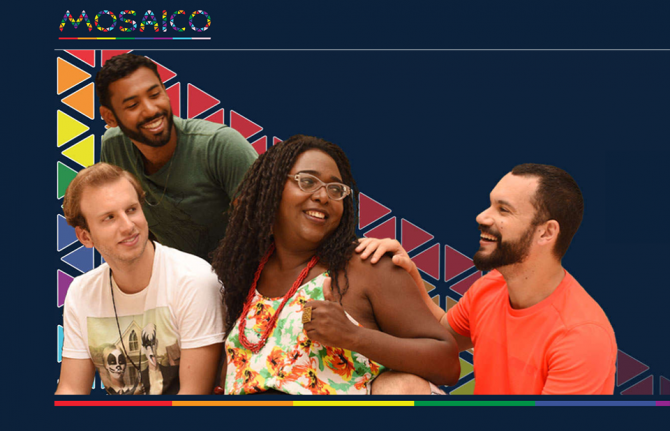
Press Statement
The end of the Mosaico vaccine trial must be a spur to deliver HIV treatment and prevention options to all who need them says UNAIDS
23 January 2023 23 January 2023GENEVA, 23 January 2023— The end of the Mosaico HIV vaccine trial must lead to a continued drive to innovate as well as an urgency to ensure that proven HIV prevention and treatment options reach all who need them, says UNAIDS. Rapid progress against the HIV pandemic is possible if existing prevention and treatment options are made available through the sharing of technologies, expanding provision, and tackling barriers to access. The development, and sharing, of long-acting prevention and treatment options are also important to expand coverage.
“The disappointment of the vaccine trial further underlines the importance of rolling out available HIV treatment and prevention innovations, including oral PrEP, long acting injectables and the vaginal ring,” said UNAIDS Executive Director, Winnie Byanyima. “The search for a vaccine must continue, but it’s important to remember that despite this setback the world can still end AIDS by 2030 by delivering all the proven prevention and treatment options to all the people who need them.”
Although there were no safety concerns flagged during the vaccine trial, it is being discontinued after an independent review of the research found no evidence of reduced risk of HIV infection among participants. The trial began in 2019 as a private-public partnership that included the United States National Institute of Allergy and Infectious Diseases, Janssen Vaccines & Prevention B.V., the HIV Vaccine Trials Network and the United States Army Medical Research and Development Command. The trial enrolled 3900 men who have sex with men and transgender people across eight countries in Europe and the Americas, including the United States. Participants received four injections over 12 months, either of the vaccine or a placebo, with the monitoring board finding no significant difference in the HIV acquisition rate between the two groups.
Global research efforts into vaccines and a cure must carry on. At the same time, the world cannot wait for, or depend on, a vaccine or cure. The end of AIDS by 2030, as promised, is still possible, but leaders have no time to wait.
UNAIDS
The Joint United Nations Programme on HIV/AIDS (UNAIDS) leads and inspires the world to achieve its shared vision of zero new HIV infections, zero discrimination and zero AIDS-related deaths. UNAIDS unites the efforts of 11 UN organizations—UNHCR, UNICEF, WFP, UNDP, UNFPA, UNODC, UN Women, ILO, UNESCO, WHO and the World Bank—and works closely with global and national partners towards ending the AIDS epidemic by 2030 as part of the Sustainable Development Goals. Learn more at unaids.org and connect with us on Facebook, Twitter, Instagram and YouTube.
Related

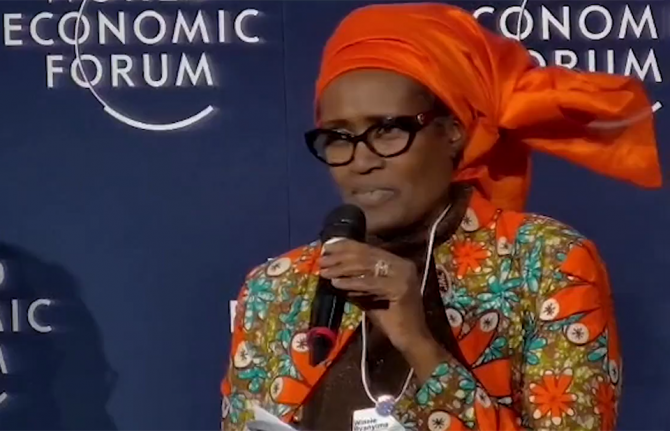
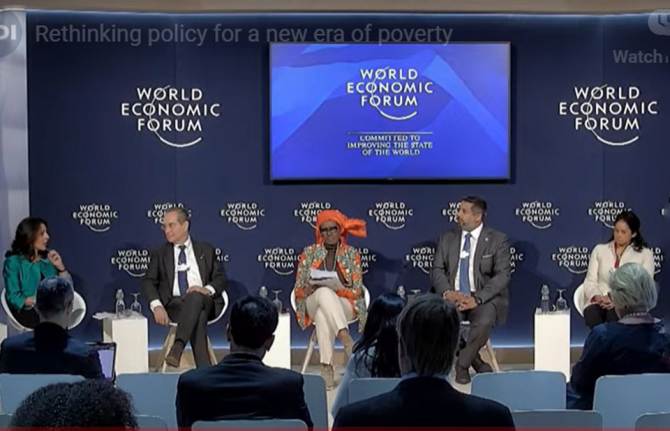
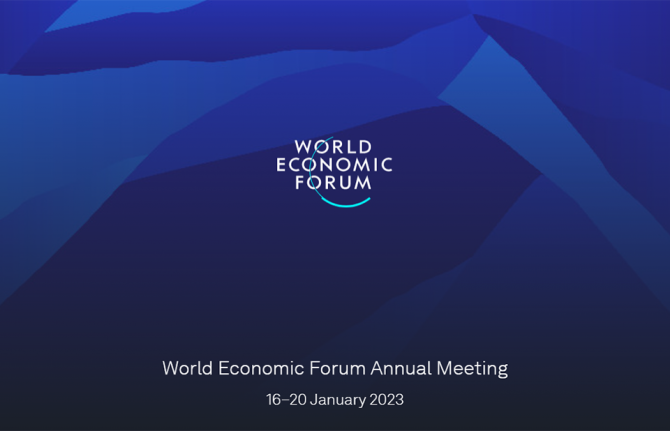
Press Statement
United Nations Under-Secretary-General calls on leaders to address the debt crisis that is crushing developing countries
27 January 2023 27 January 2023GENEVA, 27 January 2023—The Executive Director of UNAIDS and Under-Secretary-General of the United Nations Winnie Byanyima is calling on world leaders to address the unsustainable external debt service burdens of developing countries which are widening inequalities and undermining the health and livelihoods of millions of people.
Rising interest rates, a strong dollar and inflation are depleting budgets for education, health, including for HIV, and social services in highly indebted developing countries.
“Low-income countries are spending up to four times more on debt repayments than they are on health,” said Ms Byanyima, addressing global leaders at the World Economic Forum in Davos. “In 2021, almost half of all developing countries cut health spending and about 70% cut spending on education.”
Efforts to end AIDS are also being impacted. In 2021, UNAIDS saw that globally the number of new HIV infections dropped only 3.6% from 2020, the smallest annual decline since 2016. The impact was also felt in funding for HIV. Donor funding for the AIDS response was 10% lower in 2020 that it was in 2010 and domestic financing fell 2% for a second year in a row in 2020. UNAIDS estimates that continuing on the current trajectory would lead to 7.5 million AIDS-related deaths by 2030, and millions of new HIV infections.
In 2021, at the height of the COVID-19 crisis, low- and middle-income countries transferred almost US$ 1 trillion in debt service to external creditors. The International Monetary Fund calculates that over 60% of low-income countries are now in debt distress or high risk of it—22 of these countries are in Africa, the continent with the highest burden of HIV.
“COVID-19 proved to us that our health and our economies are locked together,” said Ms Byanyima. “Global leaders must urgently agree on a comprehensive multilateral legal framework to restructure the debt of developing countries. This catastrophic debt crisis is claiming lives and locking millions of children out of the future they deserve.”
She argued that health, education, social protection and climate action should be recognised as global public goods that every government contributes to. “We are becoming wider and wider apart with a global economy that extracts from the weakest and gives to those with the strongest elbows,” said Ms Byanyima.
At a time when debt repayments are crippling health budgets, rich countries are putting the profits of pharmaceutical companies, banks, private lenders and financial institutions ahead of people’s lives in the global south. Almost three years into the COVID-19 pandemic and rich countries are still preventing developing nations from producing generic COVID-19 tests and treatments.
“Without an urgent rethink, the world could sleepwalk into a convergence of health and financial crises that could crush developing countries,” said Ms Byanyima.
UNAIDS is concerned that intellectual property barriers continue to deny millions of people access to lifesaving health technologies. Long-acting medicines for HIV prevention and treatment that are today available in the global North, are still beyond the reach of the developing countries most affected by HIV.
At a time when debt repayments are crippling global south health budgets, UNAIDS is calling for the pharmaceutical company ViiV to reduce the price of long-acting HIV medicines and allow all developing countries to produce generic versions. UNAIDS is also calling on World Trade Organization member countries to ease intellectual property rules for COVID-19 tests and treatments.
UNAIDS
The Joint United Nations Programme on HIV/AIDS (UNAIDS) leads and inspires the world to achieve its shared vision of zero new HIV infections, zero discrimination and zero AIDS-related deaths. UNAIDS unites the efforts of 11 UN organizations—UNHCR, UNICEF, WFP, UNDP, UNFPA, UNODC, UN Women, ILO, UNESCO, WHO and the World Bank—and works closely with global and national partners towards ending the AIDS epidemic by 2030 as part of the Sustainable Development Goals. Learn more at unaids.org and connect with us on Facebook, Twitter, Instagram and YouTube.

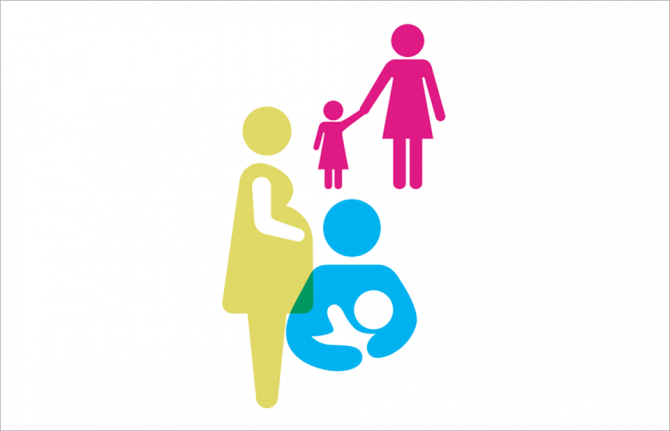
Press Statement
UNAIDS welcomes Kenya’s High Court judgement in landmark case of involuntary sterilization of women living with HIV
20 December 2022 20 December 2022GENEVA, 20 December 2022—UNAIDS welcomes the judgement by the High Court of Kenya at Nairobi recognizing that coerced sterilization of women living with HIV is a violation of their human rights.
The judgement follows a case brought forward in 2014 by a Kenyan woman living with HIV who was coerced by professionals at a health facility to undergo tubal ligation thus taking away her ability to have children. The High Court found that the performance of this operation without consent amounted to a violation of her rights to non-discrimination, to dignity, to health and to family.
“This decision is an important step in protecting the sexual and reproductive health and rights of women living with HIV,” said Winnie Byanyima, Executive Director of UNAIDS. “UNAIDS stands ready to work with all governments to ensure such practices are eliminated completely and that women living with HIV are able to access health services without stigma or discrimination.”
UNAIDS intervened in this case with an amicus curiae (friend of the court) brief that informed the Kenyan High Court on the health guidelines and human rights standards that each country must follow to respect, protect and guarantee the human rights of people living with HIV, and the impact that such involuntary practices can have on the HIV response. The Kenyan Legal and Ethical Issues Network on HIV/AIDS (KELIN) and the African Gender and Media Initiatives Trust (GEM) were also petitioners in this case.
HIV-related stigma and discrimination has a significant impact on the health, lives and well-being of people living with or at risk of HIV. Stigma and discrimination hinders the HIV response by limiting access to broader sexual and reproductive health and other health services. UNAIDS continues to work daily to ensure that governments invest in preventing and responding to violations linked to the forms of intersectional discrimination to which people living with HIV have been subjected.
The plaintiff in the case stated, “This was never about the money. I wanted to fight for justice for myself and all women who have had this experience, and to ensure this does not happen to other women who are living with HIV who need access to reproductive health services.”
“This case is an important moment for reproductive justice and the feminist movement. Coercive sterilization of women living with HIV is a violation of women’s most fundamental human rights and undermines effective HIV responses,” said UNAIDS Country Director for Kenya, Medhin Tsehaiu. “It is only through a human rights approach that we will end AIDS as a public health threat.”
A rights-based approach includes the right to start a family and have children, the right to decide the number and spacing of their children, the right to reproductive autonomy and the right to access quality services to support their reproductive health choices, based on their informed, safe and voluntary consent. These are fundamental human rights that belong to all women, regardless of HIV status, and are guaranteed in global and regional treaties.
“We welcome the court’s decision and although it took a long time, we are happy that the court found the client’s rights had been violated, and particularly the finding of discrimination on the basis of sex and HIV status,” said Allan Maleche, Executive Director, KELIN.
The Global AIDS Strategy 2021–2026: End Inequalities, End AIDS includes a central role for the promotion of human rights, gender equality and dignity, free from stigma and discrimination for all people living with and affected by HIV. It is a commitment by UNAIDS to an ambitious vision to end gender inequalities and realize human rights, including the right to health, calling on all partners and stakeholders in the HIV response in all countries to transform unequal gender norms and end stigma and discrimination.
UNAIDS
The Joint United Nations Programme on HIV/AIDS (UNAIDS) leads and inspires the world to achieve its shared vision of zero new HIV infections, zero discrimination and zero AIDS-related deaths. UNAIDS unites the efforts of 11 UN organizations—UNHCR, UNICEF, WFP, UNDP, UNFPA, UNODC, UN Women, ILO, UNESCO, WHO and the World Bank—and works closely with global and national partners towards ending the AIDS epidemic by 2030 as part of the Sustainable Development Goals. Learn more at unaids.org and connect with us on Facebook, Twitter, Instagram and YouTube.
